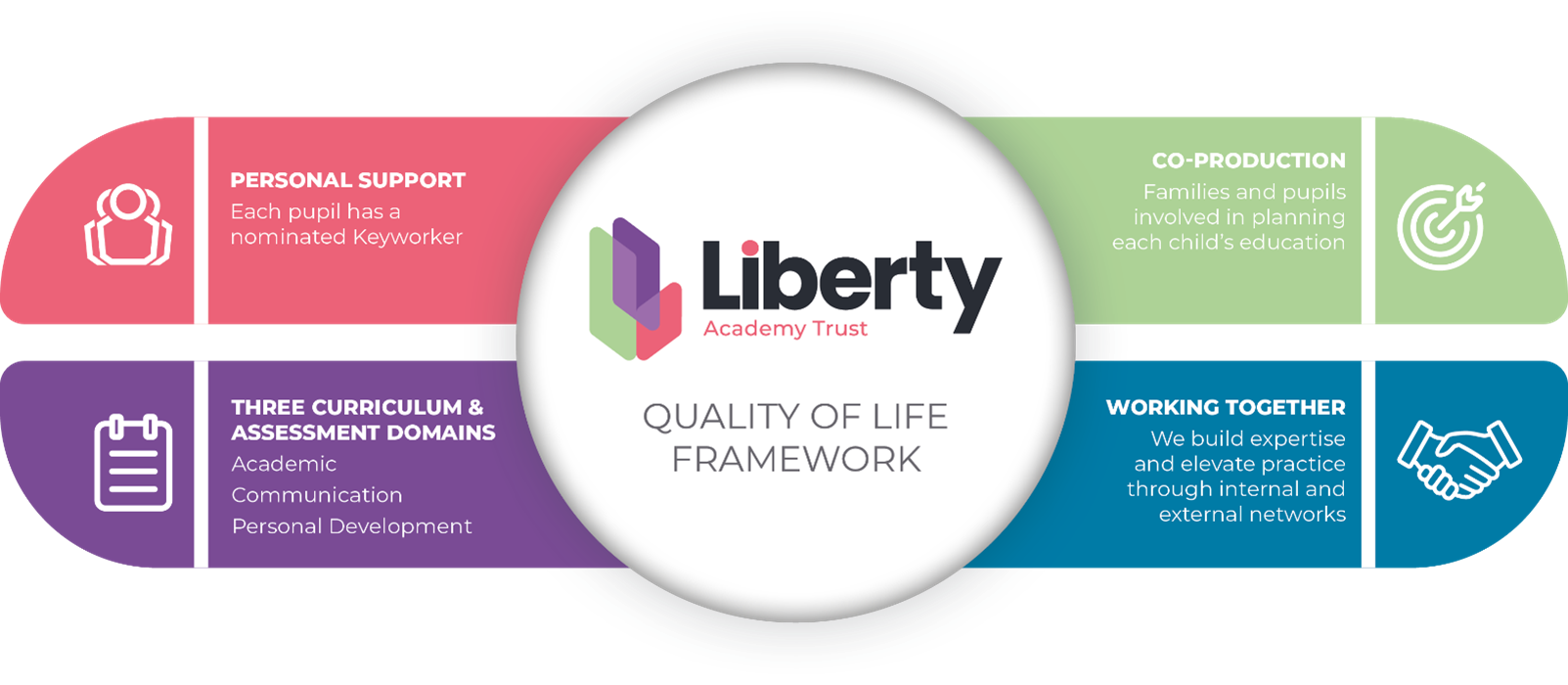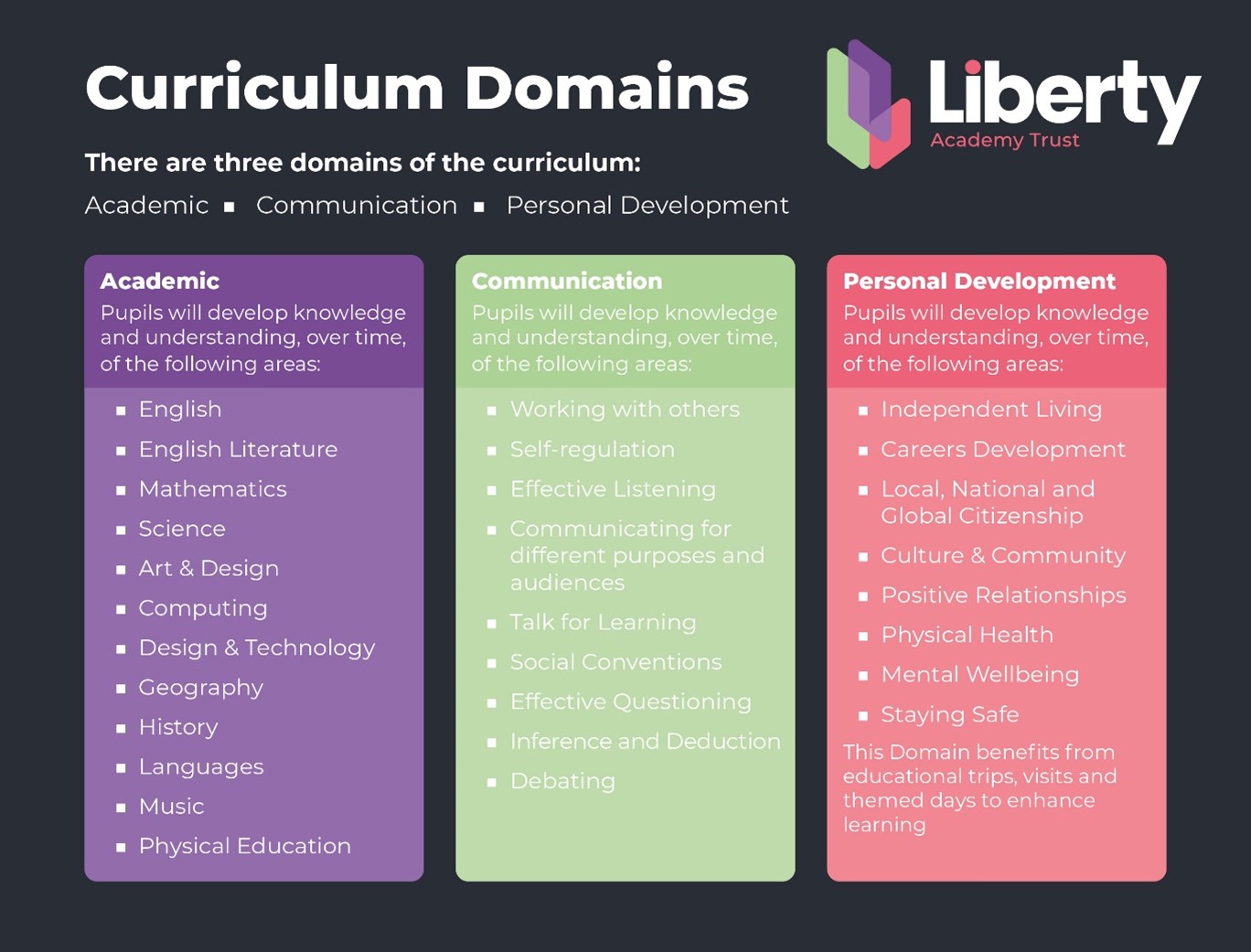Quality of Life Framework
Quality of Life Framework
The Liberty Academy Trust Quality of Life (QoL) Framework is a strengths-based model, designed to support the positive development of the whole child; it reflects the commitment of every school to support every pupil’s academic and wider needs, recognising that co-production of goals and measures of success, with families, is central to all we do.
Informed by research undertaken by Schalock et al (2010; 2020), the QoL framework allows our schools to focus on areas that support our pupils to have a positive quality of life now and in the future. Schalock’s model proposes eight core domains that should be developed and measured as indicators of success for the individual. Each of the QoL domains are interlinked as indicators and variables which have the power to influence an individual’s quality of life. It identifies eight QoL domains which are categorised into three sub-sections:
- Independence.
- Social Participation; and
- Wellbeing.
A Quality of Life Framework allows us to plan each child’s education based on what is right for now and right for the future.
The Liberty Academy Trust Quality of Life Framework has 4 domains:

1. Each pupil has a nominated keyworker
Each pupil in our schools is allocated a key worker. Their key worker is each child’s main advocate in school and a parent’s main point of contact. The key worker can be any member of the staff team who is in a good position to build and maintain trusting relationships with a young person and their family. The key worker does not work with their key child all the time as it is important they develop trust with more than one person.
Keyworker responsibilities
Pupil support:
- Seeking to understand their key child’s views and wishes and giving them a voice in their education
- Liaising with school staff to ensure they understand the pupil’s needs and wishes
- Attending annual reviews or other meetings
- Being involved in planning careers education and work experience
- Supporting the planning of transitions arrangements (entry to school, year to year transitions and leaving school)
Family support:
- Talking to the family to understand what life is like for their child
- Developing a supportive relationship, so families feel able to share information about family life that may impact on their child
- Liaising with school staff, including reporting matters that families are concerned about or have praised
- Supporting their child’s form tutor or class teacher in their communication with the family
- Giving feedback about each child’s progress and experience in school.
2. Co-production: families and pupils are involved in planning each stage of education
Families
Our experience tells us that it is only with the family’s involvement that our pupils do exceptionally well. We aim to incorporate families views into the planning and evaluation of each child’s education. We want families to feel we consult with them and that they are involved in their child’s education and development.
We consult with parents through:
- Annual review meetings.
- Parents’ evenings.
- Discussions with the child’s keyworker.
- Questionnaires, including termly parent and carer surveys.
- Informal meetings.
Pupils
Pupils learn best when they understand the purpose of their learning and when it is meaningful and relevant to them. Shaping a child’s education based on what interests them can be a great motivator to support children’s learning. We know our pupils are in our schools because they have additional special needs and these are addressed through EHCP’s, teacher support, adaptations to lesson delivery which support access to the curriculum, and individualised planning.
Quality of Life is not about focussing on the deficits, it is a positive focussed framework and ethos. It is about finding out for each pupil:
What makes them happy?
What makes them want to get up in the morning?
What are their aspirations?
How do we help them shine as a young person on the journey towards adult life?
How do we help them to be proud and be the person they want to be?
How do we give them the skills they need to be as independent as possible?
How do we support them to have a positive outlook and to live an enriched life on their terms?
QOL is about finding out about all of that and linking it to what we do in our schools.
3. Our curriculum has three domains:
In our schools we prioritise development in three curriculum domains:

The Academic Domain
The academic curriculum is built upon a traditional subject offer, informed by the English National Curriculum and delivered at the level appropriate to each pupil’s stage of intellectual development.
Where appropriate, pupils will access the same curriculum breadth as their peers in mainstream education; however, some pupils’ access will be influenced by their levels of functional understanding, with depth and breadth adapted accordingly. The underlying principle: however, is that all pupils are entitled to access an academic curriculum that is broad and relevant – no level of disability should reduce this entitlement.
The Communication Domain
The communication curriculum is central to the Liberty offer, due to the particular needs of autistic pupils. Our approach therefore comprises a structured programme of study which includes all modes of communication, such as spoken language, ICT, literacy, and visual language.
The underlying principles of the communication domain are to build lifelong skills which enable all pupils to engage in the world around them through modes of communication that can be understood by others. A key feature of the communication domain is the development of oracy skills, as this is often a key area of difficulty for autistic pupils.
The Personal Development Domain
The personal development curriculum includes a focus on personal interests, as well as skills for independent living, active citizenship, physical and emotional health and well-being. The underlying principles of the personal development domain are to ensure all pupils can flourish and thrive; perhaps capitalising on special interest areas or being introduced to new experiences, but all are expected to access a wider curriculum offer which extends beyond the academic and which develops responsible, respectful and active citizens of the future.
Themed days allow for concentrated personal development, which enhance personal qualities and dispositions, such as resilience and tolerance and which are underpinned by our core values of courage, determination and teamwork – qualities that are recognised throughout life, in business as well as personal relationships.
4. We build expertise and elevate practices through internal and external networks
Our internal networks
We hold the following internal trust network meetings:
- Autism Lead Network
- SENCO Network
- Curriculum Network
- Principals Network
- Assessment and Data Network
Each meeting is designed to share best practice and resources and to build expertise.
Our external partners
Though relatively new, there are a number of schools who can see the benefits of adopting a Quality of Life framework. Swalcliffe Park School was a pioneer in the early implementation of a Quality of Life framework in a school environment. It established a network of schools who join together to take part in research, share knowledge and develop resources. Network meetings usually take place once a term. We are extremely thankful to our partners for generously sharing their knowledge, understanding and resources.
Other key partnerships include:
- Whole Education
- Coram Life Education
- Autism Education Trust

